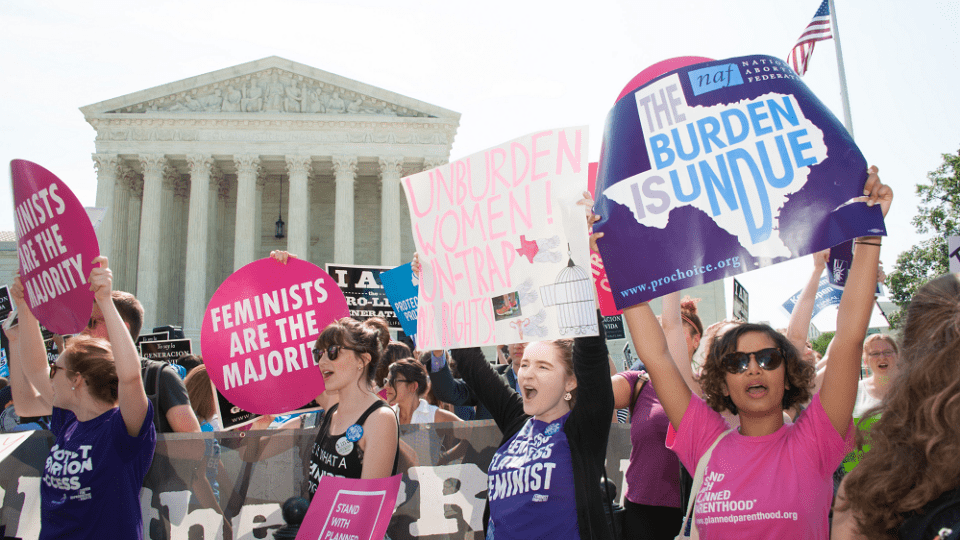Backing reproductive choice for employees became a much more difficult proposition for retailers, which could face prosecution in some jurisdictions following the June 24, 2022 U.S. Supreme Court decision in Dobbs v. Jackson Women’s Health Organization. With the court ruling that the country’s constitution offers no federal abortion protections, thus transferring this power to individual states, many well-known retailers, including Patagonia, DICK’S Sporting Goods and Levi’s are leading conversations on protecting employees’ rights, funding pro-choice organizations and supporting employee reproductive health.
The stakes are high: proposed legislation and legal actions in the most anti-abortion states could, through so-called “bounty hunter laws,” criminalize not only abortion itself but any person or entity helping someone obtain an abortion. That’s because the Supreme Court’s decision has turned the U.S. into a state-by-state checkerboard with widely varying laws regarding reproductive health. Retailers, which typically operate across multiple state lines, may find themselves implementing potentially controversial policies that only apply to workers in some states where they operate.
Additionally, since reproductive health is typically administered through insurance programs, retailers might need to work through — or work around — their own employer-sponsored programs. This latter possibility raises its own questions about employee privacy; while health care is subject to fairly stringent privacy protections, working outside this system could raise issues for both the employer and the individual.
Given these complexities, retailers’ willingness to take a public stance on supporting reproductive health is helping by making the entire conversation more open, according to Cathren Cohen, Scholar of Law and Policy at the UCLA Center on Reproductive Health, Law and Policy.
Advertisement
“One of the ways that we got here is that people were afraid to talk about abortion; it was a taboo topic,” Cohen said in an interview with Retail TouchPoints. “Many people have abortions, but they don’t necessarily talk about it as a standard form of healthcare or a pregnancy outcome that happens to a lot of people.”
Reproductive Rights Support Could Affect Retailers’ Bottom Lines
Now in the hands of state legislators, the right to abortion has been or will likely be denied in at least 24 states — even though public opinion research shows support for the personal choice of people who seek abortions. According to Pew Research, 62% of Americans support abortion being legal in all or most cases. Among adults under the age of 30, a segment whose purchasing power continues to grow, 69% disapprove of the Supreme Court’s recent ruling.
“DICK’S Sporting Goods came out strongly behind reproductive rights,” said Steve Koepp, Co-Founder of From Day One in an interview with Retail TouchPoints. “If you think back, they’re pretty independently minded. They were the retailer who banned and removed all assault weapons from their stores, and were not going to sell them anymore, which actually seemed like that would cost them a lot of business. In the end, they did better in the long run.”
Thinking about supporters of reproductive rights as potential customers is important, as 56% of shoppers surveyed by consumer insight platform Zappi felt negatively regarding a brand’s lack of support on key social issues when shopping a company for the first time.
“By taking a public stance, brands can show their customers, employees and key stakeholders that they are invested in uplifting these conversations, not to mention that brands often have the ability to create and influence more widespread change,” said Ryan Barry, President of Zappi in an interview with Retail TouchPoints. “[It’s] vital for brands to ensure that they’re showing their support for meaningful causes like the overturn of abortion rights and doing so in an authentic way, not only because it can be the right thing to do and consumers may expect brands to take a stance, but because it often helps the bottom line as well.”
Corporate Support of Reproductive Rights is Not Created Equally
A study by Morning Consult found that 47% of consumers would be supportive of companies that relocate their offices to states with fewer abortion restrictions; 56% of consumers would support a company’s decision to allow employees who fear the loss of abortion access to relocate to a different state; and 48% would support corporate funding of employee relocation costs to a state where abortion is legal. However, while some companies may have the option to relocate to states that better align with their corporate values, the nature of retailing makes such moves impractical.
The Supreme Court’s decision also has created another stark dividing line between “red” and “blue” states. “It used to be rural vs. urban [living], for example in Texas you might feel comfortable living in Austin if you’re liberal, as opposed to the Panhandle, but now this is being done across state lines,” said Koepp. “The other thing is that blue states have already started recruiting companies, like Massachusetts Gov. Charlie Baker who has openly said the state is welcoming of reproductive rights and companies should think about headquartering there.”
Another variable in terms of access to services is the jobs retail workers hold. Salaried corporate employees are more likely to get expansive health coverage from their employers compared to their hourly colleagues who fulfill store associate and warehouse worker roles, which are often part-time.
“In the U.S., about 75% of abortion patients are actually people who are poor or low income, so a lot of those people don’t work for these major corporations,” said Cohen. “The outcome of the Supreme Court decision is really going to have the largest harmful impact on populations that are less likely to be employed at the kind of company that is now making these kinds of offers.”
Additionally, those working in retail on an hourly basis are typically spread across the country, in different states with varying legislation. Some retailers have recognized the potential for unequal treatment: Patagonia clarified in a June 24 statement that it will support employees at every level of the business, covering the same level of healthcare “for all part-time and full-time employees.”
Legal Threats and Legal Protections for Retailers That Support Employee Choice
Within Texas’ State Bill 8, legislators included guidelines that support citizens who report abortions that do not fall within the law, even if the procedure is performed out of state. Known as “bounty hunter laws,” this type of legislation is gaining ground in other states where abortion is or will be banned, meaning the state can hold liable any person or entity who aids in a patient receiving an abortion — including employers. The impacts of holding employers accountable are already being felt in cases such as:
- The Texas Freedom Caucus notified law firm Sidley Austin, which supports employees’ reproductive freedom and travel out of state to seek abortion services, of the organization’s intent to seek criminal penalties and disbarment of attorneys, which could set the precedent for penalization;
- A letter requesting a U.S. Equal Employment Opportunity Commission (EEOC) investigation into DICK’S Sporting Goods was filed by America First Legal, as the organization feels the company’s financial support of employees who travel in search of an abortion is discriminatory; and
- Sen. Marco Rubio introduced the No Tax Breaks for Radical Corporate Activism Act, which would amend the federal tax code by prohibiting companies from deducting expenses related to the costs for their employees who are seeking abortion care.
Protective actions have been taken to counteract the most restrictive abortion bans. Support for comprehensive reproductive health has been established at federal and state levels through:
- U.S. Attorney General Merrick Garland’s statement regarding the Department of Justice’s commitment to protect reproductive healthcare through upholding the Freedom of Access to Clinic Entrances Act for people who travel out of state to seek abortion. On Aug. 2, 2022, Garland revealed the DOJ’s first lawsuit to protect patients against recent state restrictions on reproductive rights would challenge Idaho ahead of the state’s abortion ban scheduled to be enacted Aug. 25, 2022;
- Connecticut Gov. Ned Lamont’s May enactment of Public Act 22-19, which protects medical providers and patients who seek abortion care in his state when they travel from areas that have enacted bans; and
- California’s AB 1666, which was signed into law by Gov. Gavin Newsom and prohibits the application of “bounty hunter laws” from states where abortion is illegal.
This story has been updated to include information regarding the DOJ’s lawsuit against the state of Idaho.









